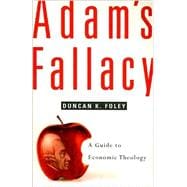
Note: Supplemental materials are not guaranteed with Rental or Used book purchases.
Purchase Benefits
Looking to rent a book? Rent Adam's Fallacy [ISBN: 9780674027299] for the semester, quarter, and short term or search our site for other textbooks by Foley, Duncan K.. Renting a textbook can save you up to 90% from the cost of buying.
| Preface | p. xi |
| Adam's Vision | p. 1 |
| The Division of Labor | |
| The Theory of Value | |
| Capital Accumulation | |
| The Invisible Hand and the State | |
| Smith's Theory of Money | |
| Adam's Fallacy Revisited | |
| Gloomy Science | p. 45 |
| Second Thoughts | |
| Malthus and Population | |
| The Context of Malthus's Essay | |
| Malthus's Postulates | |
| Malthusian Logic | |
| Population and Food since Malthus's Time | |
| Ricardo and the Limits to Growth | |
| Ricardo's Labor Theory of Value | |
| Accumulation and the Stationary State | |
| Richardo's Views on Machinery | |
| The Political Economy of Poverty | |
| The Severest Critic | p. 86 |
| Historical Materialism | |
| The Commodity and the Theory of Value | |
| Capitalist Exploitation | |
| Accumulation and the Falling Rate of Profit | |
| Primitive Accumulation | |
| The Transition to Socialism | |
| Marx and Proletarian Revolution | |
| Marxist Theory and Social Change | |
| On the Margins | p. 155 |
| Adam's Fallacy Needs New Shoes | |
| Marginalism | |
| Where Do Prices Come From? | |
| Marginalism and Social Welfare | |
| Marginalism and Time | |
| Veblen and Conspicuous Consumption | |
| Voices in the Air | p. 179 |
| John Maynard Keynes | |
| World Capitalism in Keynes's Time | |
| Say's Law and Laissez-Faire | |
| Labor Markets and Unemployment | |
| Expectations and Money | |
| The Fate of Capitalism | |
| Complexity vs. Collectivism | |
| The Prophet of Technology | |
| Grand Illusions | p. 213 |
| Looking in the Mirror | |
| Two-Armed Economists | |
| Escaping Adam's Fallacy | |
| Face to Face with Adam's Curse | |
| Reading Further | p. 231 |
| Appendix | p. 237 |
| Demographic Equilibrium | |
| Theories of Money and Prices | |
| Ricardo's Theory of Rent and Accumulation | |
| Decomposition of the Value of Commodities | |
| The Working Day | |
| Index | p. 251 |
| Table of Contents provided by Ingram. All Rights Reserved. |
The New copy of this book will include any supplemental materials advertised. Please check the title of the book to determine if it should include any access cards, study guides, lab manuals, CDs, etc.
The Used, Rental and eBook copies of this book are not guaranteed to include any supplemental materials. Typically, only the book itself is included. This is true even if the title states it includes any access cards, study guides, lab manuals, CDs, etc.